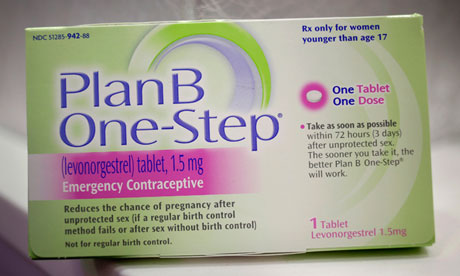
Campaigners have welcomed as a "huge breakthrough" the Obama administration's decision to give up its fight to limit the sale of a morning-after pill.
Plan B will soon become available to women and girls of all ages without a prescription, following a decade-long battle that pitted successive White House administrations and the Food and Drug Administration against reproductive-rights campaigners, physicians and women's groups seeking to make emergency contraception universally available.
Such groups have long argued that since morning-after pills such as Plan B One Step are time-sensitive and safe, they should be made as readily available as over-the-counter pain relievers. Plan B and similar medicines that delay ovulation are most effective within 72 hours of unprotected sex.
The justice department in a letter on Monday said it planned to comply with a court's ruling to allow unrestricted sales of Plan B One Step and said it would withdraw its appeal against it. It said it would put into place Judge Edward Korman's order to have the FDA approve the pill for non-prescription use.
In 2009, the pill became available without prescription to women over the age of 17 who present proof of identification. In Plan B, the synthetic hormone levonorgestrel acts to postpone ovulation, preventing sperm from coming into contact with an egg. It does not cause an abortion or otherwise end a pregnancy and will not work if a woman is already pregnant.
Reproductive-rights campaigners, who first petitioned to have Plan B available over the counter and without a prescription in 2001, said the administration should also make available other, cheaper versions of emergency contraception. Other brands of emergency contraceptives will not be similarly available. Plan B is manufactured by an Israel-based pharmaceutical firm, Teva.
Nancy Northup, president and chief executive of the Center for Reproductive Rights, said she would continue to fight for fair treatment for "women who want and need more affordable options".
"Now that the appeals court has forced the federal government's hand," she said, "the FDA is finally taking a significant step forward by making Plan B One-Step available over the counter for women of all ages. But the Obama administration continues to unjustifiably deny the same wide availability for generic, more affordable brands of emergency contraception."
Korman, who has been highly critical of the government's actions during the case, has written in court documents that the health and human services secretary, Kathleen Sebelius, acted in "bad faith" and was "politically motivated" when she overruled the FDA's 2011 effort to make the drugs available to all ages without a prescription. Barack Obama publicly supported Sebelius's decision and spoke of his two daughters, saying the thought of the drug being available without a prescription would make him uncomfortable.
On 5 April, Judge Korman issued an order that the drugs must be sold over the counter without age restrictions and within 30 days. Instead, the FDA lowered the minimum purchasing age from 17 to 15. Korman has also said that statistics show the FDA's recent decision places "a disproportionate burden" on African Americans and the less well off. This, he said, is in part because the FDA decision does not apply to generic drugs, which are typically less expensive.
In Monday's letter to Korman, Loretta Lynch, US attorney for the eastern district of New York, writes that other manufacturers could submit approval applications, but adds that the FDA might grant Teva "marketing exclusivity". Lynch states that the government and the FDA believe that only the one-step pill should be made available over the counter, because of "significant differences" between Plan B One Step and the two-step product. There was, it said, less data on the use of the two-step product as a non-prescription drug by younger adolescents.
Dr Tracey Wilkinson, a paediatrician and member of Physicians for Reproductive Health, said the administration's original appeal had surprised the medical profession because it had pledged not to put politics ahead of science. She said: "There have been mountains of evidence about the safety and efficacy of this medicine for women of all ages and so restricting it on the basis of anyone's age had no scientific basis."
Dr Wilkinson said multiple studies had also shown that "women of all ages" can read a label and take medicines that involve taking two pills, such as Next Choice and generic levonorgestrel tablets.
In a statement, Cecile Richards, the president of the Planned Parenthood Federation of America said: "This is a huge breakthrough for access to birth control and a historic moment for women's health and equity. The FDA's decision will make emergency contraception available on store shelves, just like condoms, and women of all ages will be able to get it quickly in order to prevent unintended pregnancy."
Unrestricted access to emergency contraception is supported by an array of medical groups, including the American Medical Association. Last year, the American Academy of Pediatrics said underage teens should be given emergency contraception before they start to have sex, in order to tackle teenage pregnancies.
In the US, teenage pregnancies have dropped over the last 20 years. But according to a study published last month by the Center for Disease Control and Prevention, the country still has one of the highest rates of teenage pregnancies in the developed world. There were 31.3 pregnancies per 1,000 teenagers in the US in 2011, compared with 25 per 1,000 in Britain in 2009 and 10.2 in France in 2008, according to UN figures.

